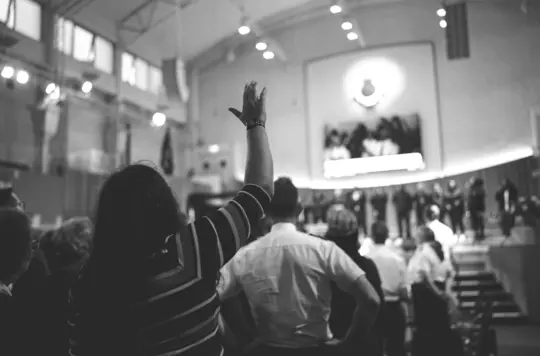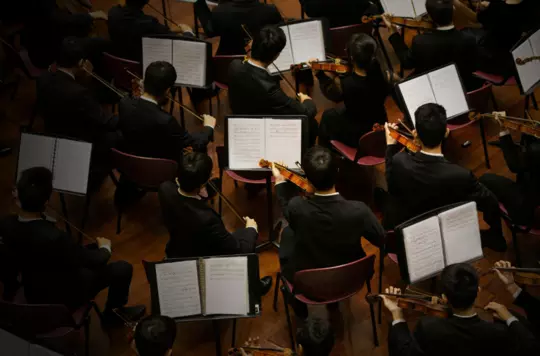18 January 2025
1 Corinthians: Growing in unity
Lieut-Colonel Jonathan Roberts
Lieut-Colonel Jonathan Roberts reminds us that every person’s distinct contribution needs to be recognised, respected and celebrated.
Key text
At a divisional event in Wales last year, people were invited to pick up a coloured ribbon and weave it on to a frame placed at the front of the hall. Dozens of people stepped forward to do this and the result was a colourful tapestry of ribbons representing the different gifts, passions, personalities and backgrounds of those within the division. It was a picture of unity woven together from diversity – a picture of the Church. Does this reflect your experience of church life?
In our study passage, the apostle Paul uses the image of a body to highlight the idea of Christian unity. He describes the Church as the body of Christ and says that, just as with a human body, the body of Christ comprises many parts held together in unity.
Paul’s point is that the Church is not just a collection of people who share the same interests, like a social club or an activity group. Instead, when we are born of the Spirit, we are united in a spiritual bond as part of the body of Christ.
Pause and reflect
- Are there any differences within your fellowship that have the potential to disrupt unity?
- How can the awareness that we are bound together by the Spirit in the body of Christ prevent disunity?
The church in Corinth needed to hear this message because diversity, which should have contributed to the richness of their life together, was threatening to destroy it. They were blessed with many spiritual gifts, but some were being valued above others. Also, there were differences in religious and social backgrounds, which had the potential to divide them.
Paul reveals three ways in which being part of the one body should affect our attitudes and behaviours.
First, unity means recognising our dependence on one another. In our culture the emphasis is often on independence and individualism. However, life in the body of Christ is to be different as we recognise our mutual dependence – our interdependence.
There may be some in the fellowship who think they have nothing to offer because they aren’t like other people (see vv15 and 16). They might feel unwanted, unimportant or even resentful at not being as gifted or having the same role as others. On the other hand, there may be some who feel superior to others because of their gifting or status and so they devalue the contribution of others (see v21).
However, everyone’s contribution is important if the body is to function properly. Without a diversity of gifts and roles, it cannot fulfil its mission (see vv17–19). Each part helps the others to fulfil their potential and serve God. We need each other.
Pause and reflect
- Think about the different people in your fellowship.
- How could you encourage them and ensure that their contribution is valued?
Paul also says that within the body of Christ we need to respect our differences. That means acknowledging that each individual has a unique and significant part to play.
He highlights the differences in the body that need to be respected. For example, some parts are ‘weaker’ but they are ‘indispensable’, some are ‘less honourable’ but deserve ‘special honour’ (see vv22 and 23). No one should be overlooked or looked down on.
We should respect our differences because the Church has been designed and created by God. He has made us who we are and placed us where he wants us (see v18). Verse 24 says: ‘God has put the body together.’ Here, Paul uses the Greek word, synekerasen, which means to mix together, to blend or to unite.
Some versions translate synekerasen as ‘composed’. For example, the New King James Version says: ‘God composed the body.’ This helps us think of the unity of the Church in terms of a piece of music in which the composer creates harmony from different notes. If all the instruments were to play the melody, we would lose the rich harmony the composer has in mind. Of course, there could be disharmony, and some might play their part so loudly that others aren’t heard, so each musician must concentrate fully, play what’s written and watch the dynamics.
In the same way, different gifts and abilities should contribute to the beauty and functioning of the body. Every person’s distinct contribution needs to be recognised, respected and celebrated.
Pause and reflect
- Does your fellowship embrace diverse gifts and abilities?
- How are people encouraged to discover, develop and deploy their gifts?
Unity also involves responding to one another’s needs. Paul says that all parts of the body of Christ ‘should have equal concern for each other’ (v25). This kind of mutual support means that when members of the fellowship are going through tough times everyone feels it: ‘If one part suffers, every part suffers with it’ (v26). Therefore, this ought to lead to prayer, encouragement and practical help.
Concern for each other also means that ‘if one part is honoured, every part rejoices with it’ (v26). Some people find this difficult and prefer to rejoice in others’ misfortunes. Such an attitude often comes from envy, a sense of insecurity or a lack of self-worth. However, in Christ we can find a loving attitude and a sense of security and self-worth, meaning we shouldn’t feel the need to bemoan others’ blessings or achievements.
Pause and reflect
- Think of someone in your fellowship who is suffering. How can you support them?
- Think of someone who is feeling blessed or successful. How can you rejoice with them?
The message of unity in diversity is for every individual church and the Church as a whole. Our differences needn’t cause divisions. Instead, they can form the colourful tapestry of the Church’s worship, work and witness.
Bible study by

Lieut-Colonel Jonathan Roberts
Divisional Commander, Wales
Discover more

Major Steve Dutfield reminds us we are responsible for helping each other to mature.

As the Week of Prayer for Christian Unity invites us to consider racial injustice, Lieutenant Nazia Yousaf encourages us to be inclusive.

During the Week of Prayer for Christian Unity, Lieut-Colonel Jonathan Roberts highlights aspects of the territory’s ecumenical strategy.

